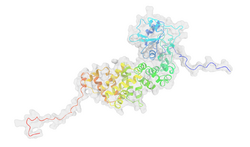Biology:Polynucleotide adenylyltransferase
| polynucleotide adenylyltransferase | |||||||||
|---|---|---|---|---|---|---|---|---|---|
| Identifiers | |||||||||
| EC number | 2.7.7.19 | ||||||||
| CAS number | 9026-30-6 | ||||||||
| Databases | |||||||||
| IntEnz | IntEnz view | ||||||||
| BRENDA | BRENDA entry | ||||||||
| ExPASy | NiceZyme view | ||||||||
| KEGG | KEGG entry | ||||||||
| MetaCyc | metabolic pathway | ||||||||
| PRIAM | profile | ||||||||
| PDB structures | RCSB PDB PDBe PDBsum | ||||||||
| Gene Ontology | AmiGO / QuickGO | ||||||||
| |||||||||
In enzymology, a polynucleotide adenylyltransferase (EC 2.7.7.19) is an enzyme that catalyzes the chemical reaction
- ATP + RNA-3'OH [math]\displaystyle{ \rightleftharpoons }[/math] pyrophosphate + RNApA-3'OH
Thus, the two substrates of this enzyme are ATP and RNA, whereas its two products are pyrophosphate and RNA with an extra adenosine nucleotide at its 3' end.
Human genes with this activity include TUT1, MTPAP, PAPOLA, PAPOLB, PAPOLG, TENT2, TENT4A, TENT4B, TENT5C, TENT5D.
Function
This enzyme is responsible for the addition of the 3' polyadenine tail to a newly synthesized pre-messenger RNA (pre-mRNA) molecule during the process of gene transcription. The protein is the final addition to a large protein complex that also contains smaller assemblies known as the cleavage and polyadenylation specificity factor (CPSF) and cleavage stimulatory factor (CtSF) and its binding is a necessary prerequisite to the cleavage of the 3' end of the pre-mRNA. After cleavage of the 3' signaling region that directs the assembly of the complex, polyadenylate polymerase (PAP) adds the polyadenine tail to the new 3' end.
The rate at which PAP adds adenine nucleotides is dependent on the presence of another regulatory protein, PABPII (poly-adenine binding protein II). The first few nucleotides added by PAP are added very slowly, but the short polyadenine tail is then bound by PABPII, which accelerates the rate of adenine addition by PAP. The final tail is about 200-250 adenine nucleotides long in mammals.
PAP is phosphorylated by mitosis-promoting factor, a key regulator of the cell cycle. High phosphorylation levels decrease PAP activity.
Structural studies
As of late 2007, 27 structures have been solved for this class of enzymes, with PDB accession codes 1AV6, 1B42, 1BKY, 1EAM, 1EQA, 1F5A, 1FA0, 1JSZ, 1JTE, 1JTF, 1P39, 1Q78, 1Q79, 1V39, 1VFG, 1VP3, 1VP9, 1VPT, 2GA9, 2GAF, 2HHP, 2O1P, 2Q66, 2VP3, 3MAG, 3MCT, and 4DCG.
References
- "Ribonucleic acid-dependent ribonucleotide incorporation. I. Purification and properties of the enzyme". J. Biol. Chem. 237 (12): 3786–93. December 1962. doi:10.1016/S0021-9258(19)84523-4. PMID 13965521.
- Edmonds, Mary; Abrams, Richard (April 1960). "Polynucleotide Biosynthesis: Formation of a Sequence of Adenylate Units from Adenosine Triphosphate by an Enzyme from Thymus Nuclei". Journal of Biological Chemistry 235 (4): 1142–1149. doi:10.1016/S0021-9258(18)69494-3.
- "The terminal nucleotidyltransferases of calf thymus nuclei". J. Biol. Chem. 241 (19): 4339–52. 1966. doi:10.1016/S0021-9258(18)99727-9. PMID 4288534.
- Krakow Js; Coutsogeorgopoulos C; Canellakis ES (1962). "Studies on the incorporation of deoxyribonucleic acid". Biochim. Biophys. Acta 55 (5): 639–50. doi:10.1016/0006-3002(62)90842-9. PMID 14459258.
- "Transfer RNA-primed oligoadenylate synthesis in maize seedlings. II Primer, substrate and metal specificities and size of product". Biochim. Biophys. Acta 247 (1): 113–21. 1971. doi:10.1016/0005-2787(71)90814-8. PMID 4946277.
- "Detection of polyadenylic acid sequences in viral and eukaryotic RNA(polu(U)-cellulose columns-poly(U) filters-fiberglass-HeLa cells-bacteriophage T4)". Proc. Natl. Acad. Sci. U.S.A. 69 (2): 417–21. 1972. doi:10.1073/pnas.69.2.417. PMID 4501121.
- "Cell-cycle related regulation of poly(A) polymerase by phosphorylation". Nature 384 (6606): 282–5. November 1996. doi:10.1038/384282a0. PMID 8918882. Bibcode: 1996Natur.384..282C.
 |


